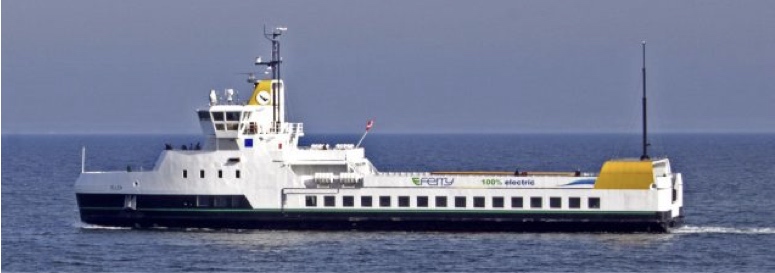World’s largest electric ferry
Battery Ferries • Charging Systems

E-ferry Ellen is a project co-funded by the EC under the H2020 Research and Innovation programme involving the design, building and demonstration of a fully electric powered ferry which can sail without polluting and CO2 emissions.
1995
The project was initiated on June 1, 2015 with a budget of 21,3 M€ with EU funding of 15 M€ and the cooperation of 9 partners. From Denmark: Aeroe Kommune, Sofartsstytrlsen, Dansk Brand-OG Sikringsteknisk-Institut, Radgivende Skibsingeniorer Jen Kristensen APS, Soby Vaerfrt A/S, Tuco Yacht Vaerft and Danfoss Mobile Elecrification of Finland, Hellenic INstitute of Transport of Greece, and LeCLanche GMbh of Germany and Switzerland.
2020
In its first year of operation on a 22 nautical mile route, E-ferry Ellen has notched up some noteworthy milestones. Operating between the Danish islands of Ærø and Fynshav, the vessel was designed by Jens Kristensen Consulting Naval Architects and built by the Søby Værft shipyard.
Just under 60 meters long and with a breadth of approximately 13 meters, the ferry travels at speeds of 12-12.5 knots, and is capable of carrying 198 passengers in summer months, with this capacity dropping to 147 during winter.
It can also carry 31 cars or five trucks on its open deck. With a 4.3 MWh capacity battery pack, the largest currently installed for maritime use, it is the first electric ferry to have no emergency back-up generator on board.
Compared to a similar modern diesel-powered ferry, making some 1,800 trips, Ellen annually saves around 2,520 tons of CO2, 14.3 tons of NOX, 1.5 tons of SO2, 1.8 tons of CO and half a ton of particulate matter. The E-ferry is charged from the local grid on the island of Ærø, whose electricity demand is entirely powered by wind. Even if Ellen were to use electricity from the usual Danish grid mix, it would still save around 2,010 tons of CO2 annually.
2027
In December 2020, it was announced that a Danish-Norwegian project aimed at building what will be the world’s largest and most powerful hydrogen-fuelled ferry had applied for EU funding.
The plan is to start operating a Copenhagen-Oslo service by 2027.Several shipping and energy firms have banded together to build a ferry capable of transporting 1,800 passengers between the two Scandinavian capitals. The vessel, which will be named Europa Seaways, will be powered by zero-emission hydrogen fuel cells
The hydrogen will be produced in Denmark using offshore wind power, meaning it will be ‘green hydrogen’ rather than grey or blue, which involves using fossil fuels in the production process.According to the project’s initial calculations, the ferry would avoid 64,000 tonnes of CO2 emissions every year, the same as taking more than 13,000 passenger cars off the road.
Europa Seaways will also be able to carry vehicles, either 380 cars or 120 trucks, on the roughly 48 hour-long roundtrip. To achieve this feat it will be powered by a 23-megawatt fuel cell, which will dwarf all existing propulsion systems.
Downloads
Download pdf of the Alternative Fuels Use Case
Denmark / EU • 1995 – 2020 • World’s largest electric ferry
Download ‘Fueling the Future’ – the complete Alternative Fuels Use Case Portfolio
Use Cases
Amsterdam • 2013 – 2025 • Electrification of all canal traffic
Private Boats • Commercial Boats • Ferries
Denmark, Copenhagen • 2018 – 2020 • Five electric ferries
Commuter Ferries • Rapid Charging
EU, The Alps • 1995 – 2020 • Electric passenger boats
Solar Ferries • Electric Ferries • Electric Water Limos
France • 2009 – 2021 • Battery, hybrid and solar vessels
Commuter Ferries • Battery Ferries • Solar Ferries
India • 2018 – 2021 • Public Private Partnership
Commuter Ferries • Solar Ferries • Solar Workboats
Italy, Venice • 2019 – 2028 • Electrification of the canal city
Water Taxis • Work Boats • Charging Network
Norway • 2014 – 2026 • National ferry regulations
Ferries
Norway • 2019 – 2021 • Electric inboard & outboard motors
Workboats • Aquaculture • e-boat Rentals
Sweden • 2014 – 2030 • The evolution of alt fuel ferries
Hybrid Ferries • BioDiesel • Battery • Charging Station
UK • 1980s – 2020 • Boats for residents and visitors
Canalboats • Narrowboats • Tourist Ferries
UK, Orkney Islands • 2020 • Consortium of partners
Hydrogen • Renewable Power
USA, California • 1970 – 2021 • World’s best selling electric boat
Recreational Boats
USA, California • 2019 – 2021 • Battery and hydrogen ferries
Commuter Ferries • Hydrogen
